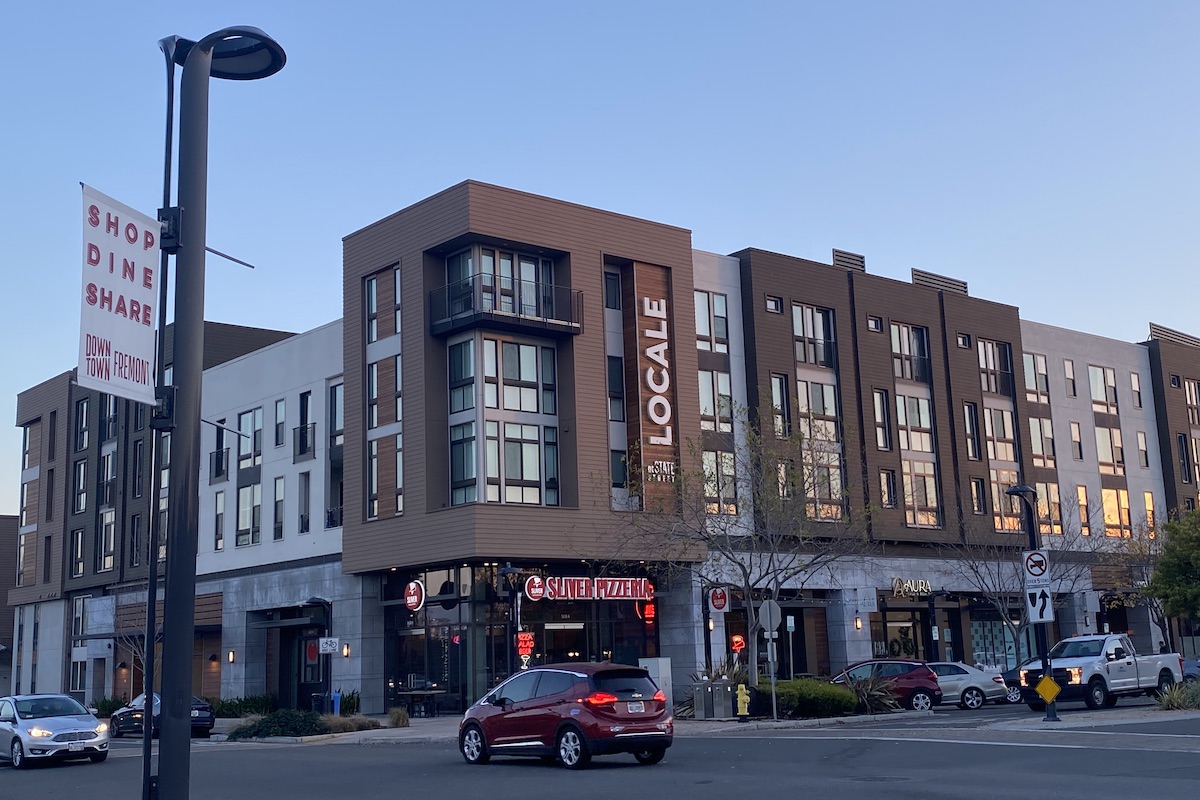News & Awards.
including honors for “Best Mixed Use,”
“Best Office,” and “Best Historic Rehabilitation”.

Fully-leased Capitol Square gains new long-term operators
The vision for the Fremont Downtown has been the same from day one: a vibrant, walkable downtown with new homes and a variety of retailers. Now the vision exists in reality, with the sale of the Capitol Square retail space to Mike Atkar, Kulwinder Atkar and the Atkar Family Trust for $12.6 million. (This is according to documents filed on Nov. 15 with the Alameda County Recorder’s Office.)
Chris DeHann, Vice President for Sares Regis Group of Northern California, explained that this step indicates the health of the retail space. Sares Regis, TMG Partners and Summerhill Homes developed The Locale, a mixed use development and one of the first completed projects in Fremont’s downtown masterplan. “[The small business tenants are] invested in the community and looking to stay longterm, and they now have an operator that specializes in operating retail centers.” David Cropper, who worked with TMG Partners during the Capitol Square project, also shared insights on the process.
DeHann expands on the role of developers versus operators. “Someone needed to go out there and take the risk to put in new space when there was nothing really else around it. Now that we’ve taken that first step, it’s given other groups like Fremont Bank…the confidence to go out and invest in building along Capitol Avenue.”
Fremont’s Downtown Community Plan aims into a 110 acre space bordered by Walnut and Mowry Avenues, Paseo Padre Parkway, and Fremont Boulevard, an official heart for a city that originally incorporated out of five individual townships in 1956. According to the city website, it also represents an “Opportunity Zone” where developers and investors can receive Federal tax credits for their projects.
In a press release, City of Fremont Economic Development Director Donovan Lazaro shared, “The forward-thinking development team behind Capitol Square bought into the community vision before anyone else was willing to, setting the bar for future projects and proving that there is demand from both retailers and residents for a vibrant, walkable and urban mixed-use district.”
According to David Cropper, the city also invested in the space by narrowing the wide Capitol Avenue to two lanes with street parking along the sides and adding trees and EV parking stalls. Although flexible zoning allows for parking garages along with taller buildings, so far there’s no garages or designated retail parking—because existing lots and repurposed street space have sufficed.
While the overall plan for downtown has stayed the same, some details are flexible. “I like to say we leased up the center twice actually,” DeHann remarks. “Before COVID there was a lot of activity in the fitness space. We had one mix of retail tenants, and then COVID happened. Since then the retail world has gone a lot more experiential. We see things like the Food Hall, which we’re really excited to have. That would have been a fantasy before COVID for us.” The Food Hall, which held its grand opening the Saturday before Thanksgiving, shares a dining space among food vendors for Korean fast food, mochi donuts and coffee.
He continues, “I do think the Capitol Avenue project represents a new wave of what people want in retail. It’s walkable, it’s smaller local businesses. It’s less of the big box shopping centers that you see in Fremont and other cities up and down the coast. In that respect it’s on trend, and clearly so because we were able to lease it up with basically all small businesses. We’re really proud of that.” Among the businesses are Banter Bookshop, Deka Lash, and Din Ding Dumpling House.
What of the Hub, just across Fremont Boulevard? First, the Kimco-managed shopping center is also looking to develop, as part of Fremont’s City Center Community Plan, adding mixed-use retail and housing. In the meantime, a thriving Capitol Square will give adjacent retail a boost as well. “Retail is synergistic,” DeHann says. “People love to be around other retailers.”
One concern locals may have as the downtown moves forward is the presence of homeless people—unavoidable when the city’s Housing Navigation Center is behind City Hall, just a block down Capitol Avenue. DeHann shares that there were complaints of nuisance and loitering when the buildings were still empty. But those have subsided as the shopping center became more lively. He says, “The more active use in the area, the less problems of vacancy we’re seeing.” When the space is bustling and well taken care of, hopefully that will encourage all residents to show courtesy to each other.
A few businesses are still pending for Capitol Square, such as Pints of Joy, an ice cream shop with both standard and Indian cuisine-inspired flavors—such as salted guava. But there’s much to experience already.
DeHann concludes, “We’re thankful for the tenants who raised their hand and took a risk to be the first to open on Capitol Avenue. Now that the center is fully leased, open and operating—we’re starting to see Yelp reviews pour in—it’s getting crowded which I will say is a good thing because it means there’s tons of customers. It’s just a joy to see. The fruition of 10 years of work and investment.”


